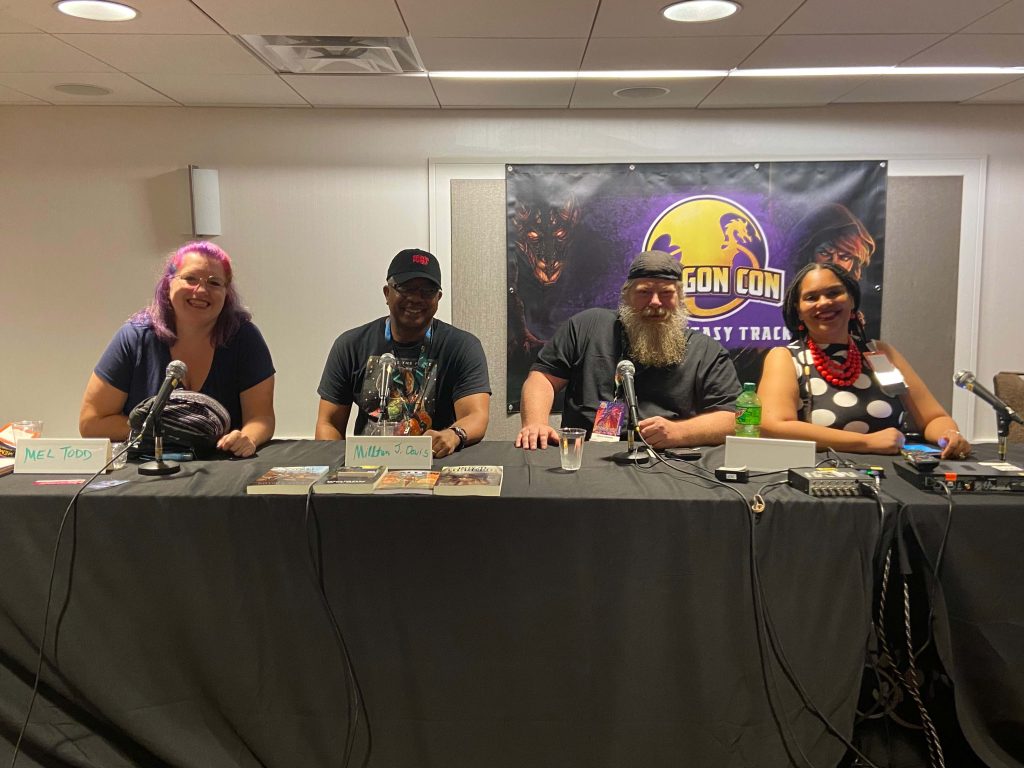
The High Fantasy track kicked off its Friday programming with a 10AM panel in its Marriott track room (L401-403) examining the Conan franchise on film. Moderated by Mel Todd, Milton Davis, Brian D. Anderson, and Violette Meier discussed the film adaptations of Robert E. Howard’s famous barbarian hero.
Conan exploded onto the big screen, and popular culture, with 1982’s Conan the Barbarian. Written by Oliver Stone and directed by John Milius, the film starred an award-winning body builder named Arnold Schwarzenegger. The film became a genre-defining landmark. Anderson argued that seeing this film “changed my life.” A widely published author or co-author of several novels, series, and anthologies, he realized through Conan that there was “more to fantasy than Tolkien.” Specifically, he saw that the genre could be dark, gray, and gritty.
As is the case for most fans of the Conan franchise, Davis pointed out that Schwarzenegger’s portrayal defines the character. His physicality was “perfect.” While Schwarzenegger’s acting left much to be desired, his portrayal left such an impression that it is difficult for Davis to imagine anyone else in the role. Anderson pointed out, though, that Schwarzenegger’s Conan is not “canon.” Of all the film adaptations of Howard’s work, it is Jason Mamoa’s Conan that is closest to the text.
What made the difference in Conan the Barbarian was the cast of actors Milius put around Schwarzenegger. The consensus among the panel was that James Earl Jones’s portrayal of Thulsa Doom absolutely stole the show. Jones brought an intensity and gravity to the role that more than compensated for Schwarzenegger’s limited acting repertoire. Anderson even pointed to the opening scene, which set the table for the entire film. Long time character actor William Smith played Conan’s father teaching his son the “riddle of steel.” The 1982 Conan the Barbarian simply set the bar for every subsequent adaptation.
1984 brought Conan the Destroyer, and all agreed that it was a weaker sequel. Davis saw the film as an attempt to broaden the audience and capitalize on the original’s popularity. It essentially became, for Davis, a fantasy film. The sequel lost the “gravitas” of the original, and Conan changed. He ceased to be an anti-hero and became a fantasy “hero.”
Todd then turned the discussion to 1985’s Red Sonja and asked whether the film should be considered part of the Conan canon. Anderson had strong feelings about this film. Howard created Sonja who was, according to Anderson, a “great character” deserving far better treatment. Meier loved the character, who was one of her first female heroes. All felt the film could have been much more, a recurring motif of their analysis.
Of the later iterations of Conan on film, by far the one most discussed was Marcus Nispel’s 2011 Conan the Barbarian starring Jason Mamoa. Clearly the most appealing component of this film was Mamoa himself, whose portrayal more accurately reflected the character Howard created. The problems with both plot and narrative were many, but they all agreed that if another Conan film were made, Mamoa should reprise the role.
The most striking moment of the panel came toward its end when Milton Davis offered an insightful point of analysis. Howard, he argued meant to show us that “civilization is not really civilized.” Conan was a “barbarian,” with all the baggage the term carries with it. Nevertheless, he was honest, loyal, and straight forward in his dealings with others. In Howard’s work, Davis sees the very definition of civilization, and the way in which we both understand and use the term, being called into question. The panel didn’t really have a chance to explore this proposition further, but it has all the makings of a panel at a future Dragon Con.
